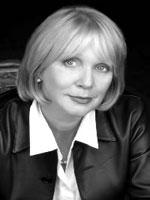Frances Kazan
Writer
I have been a member of the Library since 1978. There were the early years, when I wrote my first novel in the communal writing room. In those days, typewriters were not permitted in the writing rooms; we wrote in longhand. With the exception of the occasional dropped book or breaking lead, the silence in that room was akin to a meditative aura. I could hear my fellow writers breathe. Years later, I saw a photograph of Virginia Woolf's writing table set at the edge of a pristine garden, on the table top a pencil and pad. The writing room circa 1980 came to mind at once.
Perhaps the zenith of my Library experience was during the early 1990s when I was pursuing an advanced degree in Turkish studies. The card catalogue revealed a sure trove of rare and unusual books about the Near East. Even the Ottoman specialists at Princeton were amazed by the scope of the collection. For those unfamiliar with this section of the Library, these riches include the memoirs of Turkish feminist writer Halide Edib Adivar and of the American ambassador Henry Morgenthau, and a history of Turkey by Mary Mills Patrick, president of the American Girls' College in Istanbul in the 1920s, to name but a few. I found both volumes of Edmondo De Amicis' Constantinople, and an obscure book by a French botanist on the flora and fauna of the Bosphorus, published in 1822. Needless to say, it was a first edition. All of these were extremely useful when I wrote my novel Halide's Gift.
Although my visits to the Library have become less frequent, I still enjoy browsing the stacks in search of little-known works about the Ottoman territories before and after World War I. Unhindered by theory and political correctness, the tone of some of these writers might irritate the modern reader, but their memories and observations are instructive, for "the past resembles the future as water resembles water," to quote the Arab historian Ibn Khaldun. We are fortunate to have this unique resource at our disposal.

